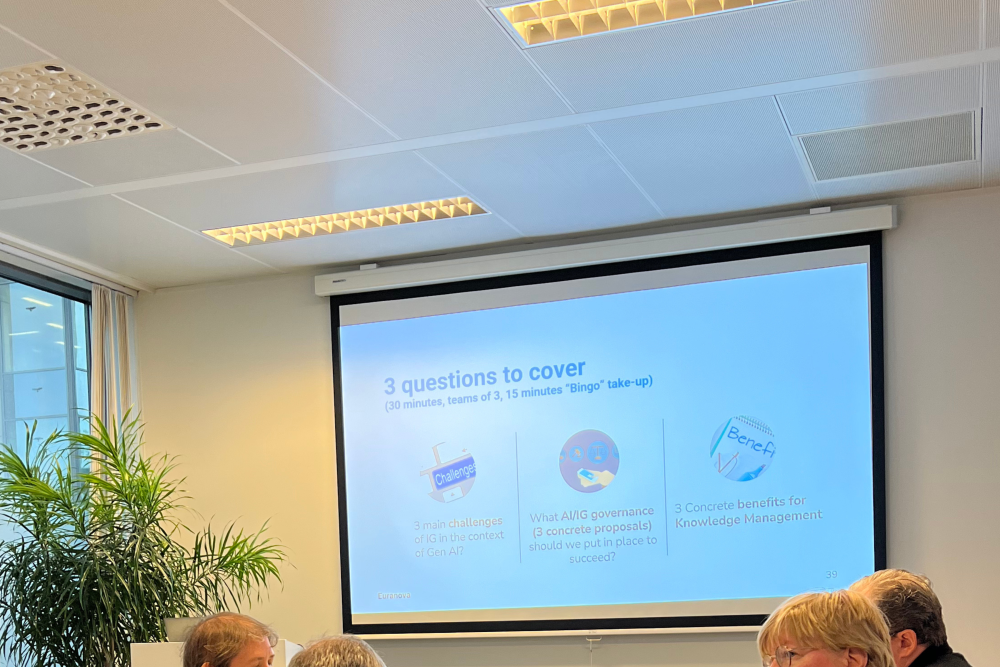AI & Knowledge Management, Challenge or Opportunity?

By Charles Bonneau, Knowledge Manager at Euranova
Together with Fasttrack, we invited a community of knowledge management practitioners to discuss the challenges and opportunities of artificial intelligence in the field. In this article, let’s dive together into the key insights from the discussion between knowledge managers, and in bonus, my own experiments with AI in training. I hope you find the reading insightful, if you have any questions or feedback, feel free to reach out—I’d love to hear your thoughts!
AI for training
AI is transforming how organisations manage and leverage knowledge, particularly in training and learning. As knowledge managers, we are at the crossroads of a shift—AI can accelerate knowledge dissemination, personalise learning experiences, and automate content creation. But with these opportunities come challenges: authenticity, accuracy, and the “human touch”.
So, what to do?
As Knowledge Manager at Euranova, I co-hosted a workshop on "How to leverage AI to use Knowledge as the source of training materials". Together, knowledge managers from various organisations gathered to identify a wide range of opportunities offered by AI in the field of Learning and Development, which we grouped into four main categories:
- Collect and centralise knowledge: AI can bring together knowledge dispersed throughout the organisation and make it easily accessible to all. It creates a centralised point for all knowledge, enabling it to be shared and disseminated. Moreover, it can learn from experts and become a virtual mentor for learners.
- Create engaging learning content: AI automatically generates training content (modules, quizzes, etc.), freeing up trainers' time. It allows the integration of interactive elements such as case studies, quizzes and visual content (images, videos), or create a variety of media, such as audio podcasts.
- Tailor content to learners' needs: AI structures training content in a logical and pedagogical way, enabling experts to tailor their content to the level and needs of each learner. Two fun applications of AI are forcing the generative model to "hallucinate" information to test learners' comprehension or generate immersive virtual environments for extended reality training (augmented, virtual).
- Target the audience and distribute the content: AI adapts content and offers personalised training paths, or translate training content into several languages.
So, what does this mean in practice?
Inspired by the many ideas and discussions that emerged during the workshop, I decided to put some of the suggestions into practice.
I focused on content generation using a combination of tools:
- ChatGPT for structuring training materials and generating quizzes. My approach is based on the use of language templates that I customise with specific prompts to incorporate good pedagogical practices such as anchoring, interleaving and spacing.
- HeyGen for producing AI-powered videos.
- ElevenLabs for voice cloning, allowing content to be narrated in multiple languages.
By starting with a simple document listing key concepts, I was able to generate the outline and script of an online training module, then using my virtual avatar and the clone of my voice, I was able to produce an engaging video. While not perfect, it looks very promising. Here's the result: Learning theories.
I also made another attempt at a video podcast with completely generated people. Although impressive, the result lacked authenticity—reinforcing the need to balance AI automation with human oversight: Learning theories - podcast.
In Conclusion
Generative AI offers undeniable advantages in terms of time savings and content standardisation. However, I've also noticed a few limitations, such as the presence of occasional errors, a certain lack of authenticity and the difficulty of obtaining perfect results when creating videos or synthetic voices.
My advice for training professionals who want to embark on the AI adventure?
- Quality first: choose reliable knowledge sources and systematically check AI-generated content.
- Careful data = convincing results: the quality of input data is crucial to obtaining relevant results.
- Dare to experiment: test different formats and technologies to find the ones that best suit your needs.
This workshop confirmed that generative AI opens up an immense field of possibilities for training. By combining human expertise and artificial intelligence, we can create more engaging, personalised and effective learning experiences.
What are your thoughts on the potential of AI in training? Do not hesitate to reach out at [email protected] to share your comments and ideas!